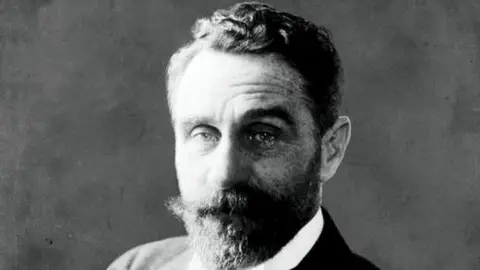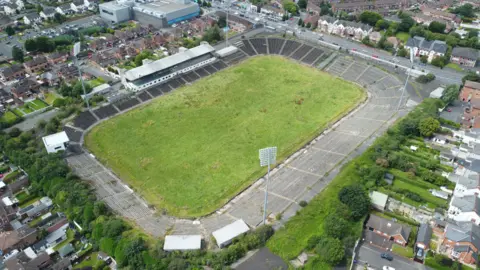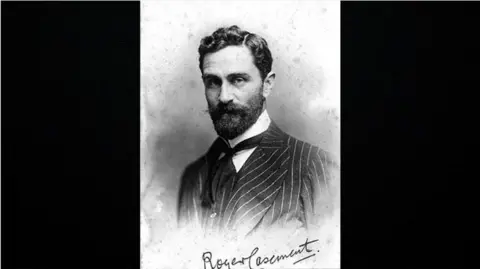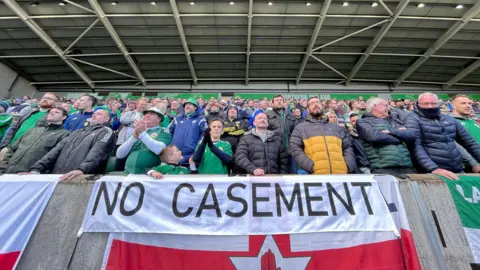Casement: The name on Belfast's controversial stadium
 Press Association
Press AssociationIn the heart of west Belfast, a derelict stadium named after Irish revolutionary Roger Casement has become the focal point of a complex political row.
It's an argument which goes beyond the hundreds of millions it will cost to rebuild.
There have also been concerns over publicly funding a facility which bears the name of an Irish rebel, executed for high treason.
But who was Roger Casement?
His story is told in a new BBC Sounds podcast series, The Mystery Of: Casement, Rebel Knight.
 PA Media
PA MediaKnight of the Realm
Roger was a Dublin boy, the son of a British Army officer.
The family moved to County Antrim when he was a teenager, where he attended the school which is now Ballymena Academy.
He left at 15 to begin work in the office of a shipping line in Liverpool.
That job led him to work on one of the company's ships transporting goods to and from the Congo River in West Africa.
A job with the International African Association established by the Belgian King, Leopold II would follow.
Patrick Casement, the great grandson of Roger's second cousin, still lives in the family home and has kept records of letters written by Roger during his time in Africa.
"He was driven in a way, and you get that sense from his incessant letter writing," said Patrick.

Roger writes of his inability to ignore the terrible treatment of the locals, who were exploited by the Europeans.
"He had seen evidence of maltreatment and atrocities before we went up into the rubber plantations, but I think what he saw there shifted his whole view of the colonial experience," Patrick said.
"It was a turning point in his life."
Roger later worked for the British Consular Service and in 1903 produced a damning report into atrocities he witness in the Congo.
His exposing of human rights abuses earned him not only international renown and a knighthood, but also a bitter resentment of colonial powers which would eventually lead him to the gallows.
Dr Reuben Loffman, from Queen Mary University of London, says Roger deserves to be remembered for "taking African voices seriously".
Rebellion
Despite being knighted in 1911, Roger had a pivotal role in founding the Irish Volunteers, and publicly canvased for donations as part of the groups bid to end British rule in Ireland.
In an attempt to capitalise on Britain's feud with Germany during World War I, he was a principal organiser in the purchase of weapons which were to be shipped from Hamburg.
Roger, along with fellow rebels Robert Monteith and Daniel Julian Bailey, was ferried back to the coastal waters off Ireland aboard a German u-boat.
They made their way ashore in a small rowing boat with rifles to be supplied to the armed rebellion known as the Easter Rising.
The rising was ultimately a military failure and Roger's involvement led to his conviction for high treason.
Some of the weapons were retrieved from the seabed and presented as evidence at his trial.
On 3 August 1916 Roger was hanged in London.
A divided legacy
 PA Media
PA MediaSome unionist politicians in Northern Ireland have called for any rebuilt stadium on the site of Casement Park to be given a different name, and point to several other GAA grounds which have been named after Irish republicans.
The political changes Roger pursued in the early 20th century are still contested today.
He is remembered by some as a revolutionary and human rights activist responsible for exposing atrocities in Africa.
To others, he is a symbol of unwanted rebellion.
